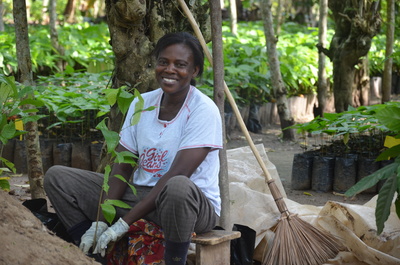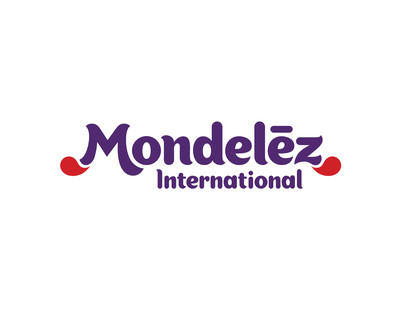DEERFIELD, Ill., May 5, 2014 /PRNewswire/ -- Mondelez International has unveiled plans to help advance the rights of female cocoa farmers in two of the world's largest cocoa-growing countries, Ghana and Cote d'Ivoire. The action plans respond to new third-party assessments by Harvard University and CARE International, which revealed striking gaps in income and opportunities for female cocoa farmers. In Ghana, female cocoa farmers earn 25-30 percent less than their male counterparts; in Cote d'Ivoire, women in cocoa communities earn up to 70 percent less than men. And in both countries, women struggle with lower farm
productivity, smaller farms and less access to financing and farm inputs.

"Gender equality benefits everyone and is essential if cocoa communities are to thrive," said Christine M. McGrath, Vice President of External Affairs and Cocoa Life. "These assessments underscore the size of the challenge we face in boosting female cocoa farmers' incomes and advancing women's rights in cocoa farming. This affirms our decision to promote gender equality as a cross-cutting theme when we first created Cocoa Life, and it bolsters our resolve to help lead the fight to eradicate this issue in Ghana and Cote d'Ivoire, our two largest cocoa origins."
In 2013, Mondelez International pledged to extend its reporting on gender rights in cocoa farming and apply a consistent approach to gender programs in its origin markets, while advocating for industrywide action. The new third-party assessments on the status of women in cocoa communities were completed by Michael J. Hiscox and Rebecca Goldstein of Harvard University for Ghana, and by CARE International for Cote d'Ivoire. Both are publicly available at www.cocoalife.org/progress.
Gender Assessments in Ghana and Cote d'Ivoire
In Ghana, Harvard University's Hiscox and Goldstein study indicates dramatic gender gaps beyond cocoa income and productivity: women have a 25 percent lower level of training, a 20 percent lower receipt of loans, and 30-40 percent lower access to critical farm inputs such as fertilizer. The Ghana study found major levers for change are farmer training and access to finance, which are strong predictors of use of key inputs on farms, thus, improving productivity and income.
"The clear implication is that Cocoa Life program interventions that effectively address gender gaps in farmer training and access to finance could have large positive impacts on productivity and income levels for female farmers and sharply reduce gender inequality in the sector," said Michael J. Hiscox, Professor of International Affairs at Harvard University, and co-author of the Ghana assessment.
In Cote d'Ivoire, CARE International affirmed the crucial role women play in the cocoa economy - but there is much work to be done to achieve gender equality, because the starting point for women is so low. For example, the research found that of the 4 percent of women in cocoa co-ops, almost none are in leadership positions. On land ownership, the study found that 86 percent of men had legal rights to their plots, while in 67 percent of cases, the land accessed by women was not owned by them.
CARE International noted after one year of Cocoa Life's gender-related interventions, there are some tangible results in the involvement of women in community-level leadership and financial inclusion. However, more needs to be done to deepen partners' and stakeholders' understanding of the challenges faced by women in Cocoa Life communities, especially participation in decision-making processes as well as access to assets and income-generating opportunities.
Cocoa Life Action Plans
Mondelez International's new action plans build on its Cocoa Life sustainability program, a $400 million, 10-year effort launched in 2012 based on its successful Cadbury Cocoa Partnership in Ghana, which has promoted gender equality in cocoa production since 2008. In Cote d'Ivoire, where Cocoa Life is expanding from pilot to full implementation, Mondelez International will take the following actions:
- Integrate gender awareness among Cocoa Life program leaders at all levels; incorporate the perspective of female farmers in program design and implementation; and use local cocoa platforms to promote gender goals
- Set clear gender-equity targets for Cocoa Life following baseline survey work in 2014
- Establish criteria to guarantee women's involvement in training and access to finance to help ensure women are benefiting equally from Cocoa Life, even when the participating household farmer is male
- Tailor interventions to address gender gaps in areas such as training topics, materials and methods as well as in Cocoa Life's Livelihoods and Community focus areas
- Track progress against key performance indicators and local metrics in response to the commitment to gender mainstreaming for each program objective and focus area
In Ghana, Mondelez International will take the following actions as it continues to expand the Cocoa Life program to more communities:
- Improve farming training for female farmers and women working on cocoa farms; increase women's access to finance, farm inputs, land ownership and membership of farmer organizations
- Help women develop other livelihoods by increasing their access to finance, improving business entrepreneurial skills, and teaching the importance of household food security
- Empower women to play an active role in decision making in households, communities and district and national farmer forums; engage women in developing Community Action Plans
- Train community leaders, Cocoa Life implementing partners and staff in gender awareness; engage district and national government institutions on issues affecting women
- Support literacy programs in collaboration with the Ministry of Education and community reading clubs
- Track progress against key performance indicators and local metrics in response to the commitment to gender mainstreaming for each program objective and focus area
Advocating for Women's Empowerment in the Cocoa Sector
Mondelez International continues to advocate for women's empowerment through multi-stakeholder organizations such as the World Cocoa Foundation to establish sector-wide principles for cocoa sustainability that include gender equality. In addition to signing the United Nations Women's Empowerment Principles in 2013, the company is continually sharing gender learnings and advocating for collaborative action to address women's empowerment with farmers, governments, industry (chocolate companies, cocoa processors and traders) and civil society experts.
About Mondelez International
Mondelez International, Inc. (NASDAQ: MDLZ) is a global snacking powerhouse, with 2013 revenue of $35 billion. Creating delicious moments of joy in 165 countries, Mondelez International is a world leader in biscuits, chocolate, gum, candy, coffee and powdered beverages, with billion-dollar brands such as Oreo, LU and Nabiscobiscuits; Cadbury, Cadbury Dairy Milk and Milka chocolate; Trident gum; Jacobs coffee and Tang powdered beverages. Mondelez International is a proud member of the Standard and Poor's 500, NASDAQ 100 and Dow Jones
Sustainability Index. Visit www.mondelezinternational.com and www.facebook.com/mondelezinternational.
Photo - http://photos.prnewswire.com/prnh/20140502/83776
Logo - http://photos.prnewswire.com/prnh/20121003/MM86695LOGO
SOURCE Mondelez International, Inc.




